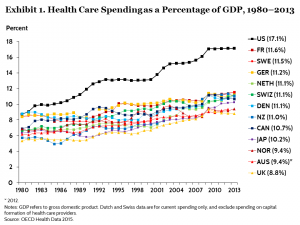
Medical Marketing: The Big Business of Healthcare
Healthcare is big business.
 Americans spend more on medical services and products than consumers in other countries. In 2021 healthcare costs increased by over 4% to $4.3 trillion or $12,530 per person. This now accounts for 19.7% of our Gross Domestic Product (GDP). The problem is health care costs are growing faster than the economy. Given the events of the past few years, one might think spending increases were related to the pandemic, but this is not the case. Most of the increases in spending were indirectly related to a massive increase in marketing, especially direct-to-consumer marketing.
Americans spend more on medical services and products than consumers in other countries. In 2021 healthcare costs increased by over 4% to $4.3 trillion or $12,530 per person. This now accounts for 19.7% of our Gross Domestic Product (GDP). The problem is health care costs are growing faster than the economy. Given the events of the past few years, one might think spending increases were related to the pandemic, but this is not the case. Most of the increases in spending were indirectly related to a massive increase in marketing, especially direct-to-consumer marketing.
It is estimated over 30 billion dollars will be spent on direct-to-consumer marketing in 2021. Such promotions can be seen in drug advertising with disease-awareness campaigns. These have grown exponentially over the past few years. Presented in a format touted to bring awareness and funding to disease states, these campaigns are nothing more than marketing ploys to drive more business through more testing, pharmaceutical drugs, or procedures.
For example, in October, “Breast Cancer Awareness Month” was started by the American Cancer Society and Imperial Chemical Industries, now recognized as AstraZeneca, one of the largest pharmaceutical companies known for its breast cancer chemotherapy drugs. The campaign has been beneficial in driving profits since more screenings mean more treatments for discovered cancers. The pink ribbons, now a campaign hallmark, are often a lucrative ploy for companies to drive business from patients and survivors. Very little is spent on true cancer prevention or researching the ultimate need. In fact, less than 20% of funds generated by Susan B Komen go towards research or prevention. The rest goes to marketing and administrative costs.
Other promotional efforts have increased exponentially in the past few years since 1997 when the FDA eased restrictions on drug advertising.
By 2016 the investment in overall marketing increased by over 69%. Most of this increase has been paid by Big Pharma, but hospital systems are a close second. Direct-to-consumer advertising in the form of ads on TV, radio, billboards, newspapers, social media, periodicals, and billboards has exploded. Unfortunately, these ads are becoming a powerful health- information source driving consumer decisions, spending, and costs. These corporate healthcare companies claim they are providing information to patients about diseases and treatment options. Still, often they use fear or promotion of drugs and services similar to that of a street pusher.
The biggest concern is these direct-to-consumer marketing ploys are driving up costs to patients and the government through expensive, unnecessary drugs and treatments.
The rising costs are unsustainable, and we are on a path of destruction. There may not be much we can do from a governmental level (many politicians are heavily funded by pharmaceutical and hospital lobbyists). Still, we can certainly address this at a personal level. Simply becoming more mindful of where we spend our personal dollars is key. Focusing on prevention rather than treatment is the key to controlling costs and improving the health of ourselves and our society. We must not allow corporations to hack our minds and convince us otherwise.
Medical Marketing Stats by the Numbers
And the winners are…
- Dupixent Immunologic $523.9 million in 2021 for DTC ads
- Rybelsus Diabetes drug $307.6 million in 2021 for DTC ads
Campaigns aimed at indirectly marketing a drug or vaccine
- Abbvie’s “Human Dignity Campaign” promoting Rapid COVID tests $66 million in 2021
- Pfizer/BMS Alliance’s “No Time to Wait” encourages patients to see their doctors about heart disease diagnosis and management. $37.6 million
- Eli Lilly Olympics 2021 $33.4 million
- Pfizer’s “Science Will Win Campaign” promoting their vaccine in 2021 $33.4 million.




